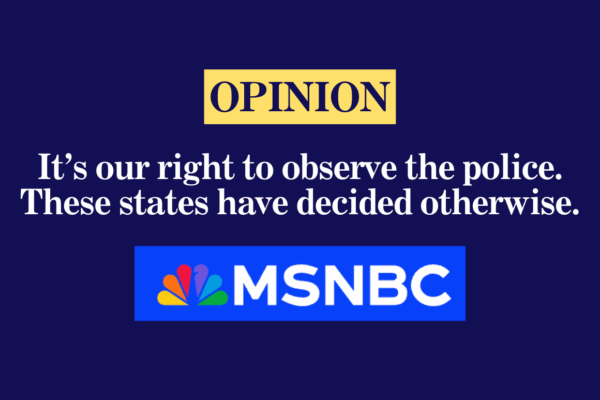In May 2020, Teliah Perkins was sitting on her front porch enjoying the end-of-spring sun in St. Tammany Parish, a suburb across Lake Pontchartrain from New Orleans. She was approached by two deputies from the St. Tammany Parish Sheriff’s Office who said they were responding to a report that she’d been driving a dirt bike recklessly and without a helmet. Their accusation quickly turned into a confrontation. Perkins, a Black woman, was thrown to the ground by the two white officers who forced their body weight on her as she pleaded, “Why are you choking me?”
When Perkins’ 14-year-old son came outside and began recording what he saw, officers threatened him with a Taser. When her son said they couldn’t use a Taser on a child, one of them responded, “Watch me.” The officer didn’t use the stun gun on the teenager, but he did shove him out of the way and tried to block the boy’s view.
If conservative lawmakers in Louisiana get their way, then someone in the teenager’s situation could no longer legally do what he did four years ago: stand nearby and watch the police arrest a loved one. In the latest example of an alarming trend that’s spreading across the country, conservatives have proposed a bill that would make it illegal to stand, film or do anything within 25 feet of a police officer conducting official duties after an officer has ordered so. Alarmingly, three states have already passed such legislation. The Louisiana House approved the measure with a vote of 81-20 this month, and it will soon be heard by a state Senate committee.
Not only did the protests that followed a Minneapolis police officer murdering George Floyd not lead to meaningful police reform, but there’s been an awful move in the opposite direction. We’re seeing conservatives succeed in making the police officers even less accountable to the public than they’ve already been.
According to the ACLU's Louisiana police violence database, “between January 1st, 2013, and March 25th, 2024, 119 out of 134 months had at least one police killing.” In other words, in 11 years in Louisiana, there have only been 15 months in which someone working in law enforcement didn’t kill someone. The courts have long held that the First Amendment ensures our right to witness and record things that happen in public, especially things involving government officials. But with this proposed law, Louisiana is joining the ranks of several states attempting to curtail that First Amendment right by making it more difficult not just to record, but even to witness what the police are doing. Arizona, Indiana and Florida passed bills similar to the one Louisiana lawmakers are now considering.
According to the Arizona Mirror, Arizona’s law, which made it illegal to create a video recording of a police within eight feet of “law enforcement activity,” was “blocked permanently through a settlement agreement between media organizations and civil rights advocates” and the state’s attorney general. Indiana’s law was upheld by a federal judge in January. Gov. Ron DeSantis signed Florida’s 25-foot bill into law two weeks ago. It takes effect in January.
One of the few defenses we as civilians have against police misconduct is the right to independently witness and record the police in action. If laws such as these had existed in Minnesota in 2020, there might never have been footage from a passerby who saw and recorded Minneapolis police murdering George Floyd. The Minneapolis Police Department could have kept saying Floyd died in “a medical incident.”
Far too often, everyday people are the ones who help bring about justice and accountability in encounters with police — and if not always accountability, then at least attention. We have the First Amendment right to observe the police, to record them whenever we see fit, but especially when we suspect that someone’s constitutional rights are being violated.
Perkins ultimately was arrested on two felony charges of resisting an officer and battery against an officer, as well as two misdemeanor traffic violations. All the felony charges and traffic charges were dropped, and she was found guilty of a single misdemeanor charge of resisting arrest. After the arrest, the American Civil Liberties Union of Louisiana represented Perkins in a lawsuit against St. Tammany Parish Sheriff’s Office for excessive force and violating her son’s First Amendment rights. The court sided with the sheriff’s office on finding that excessive force did not happen, but said the First Amendment case could move forward. On Monday, a jury trial to decide whether her son’s First Amendment rights were violated will begin.
A troublesome feature of the proposed law is that it gives police yet another excuse to harass innocent people and to escalate their encounters with the public. There’s nothing in the bill that provides standards for when an order to stop observing should be given and how to determine whether a violation has occurred. Leaving those decisions up to the officers’ arbitrary whims will, inevitably in this state, lead to Black people facing disproportionate enforcement. It’s already true, as the ACLU determined in a civil suit, that in St. Tammany Parish, where Perkins lives, Black residents are 250% more likely than white residents to get pulled over by the St. Tammany Parish’s Sheriff’s Office. That statistic illustrates that the department needs more observation, not less.
There are other problems, too. How will officers enforce a no-standing-withing-25-feet during a protest environment? How will officers know where the 25-foot line is? Will they carry a tape measure? What if an officer moves toward someone observing them, thus shortening the distance themselves? Will that person then be subject to arrest?
s it’s written, this law allows officers to answer these questions for themselves. This law is a blatant rebuke of our First Amendment right to know what’s happening on our streets and with our tax dollars. Most dangerously, this law gives officers the justification to use force to stop someone from observing or recording.
More likely than not, this bill will pass in Louisiana. Republicans have a supermajority in the Louisiana Legislature, and dozens of so-called “Thin Blue Line” flags were used to decorate the grounds of the Louisiana Capitol for the January inauguration of Gov. Jeff Landry, who appears to be against government transparency more generally. Our last hope is that courts will strike it down as unconstitutional. Not even conservative justices should be in favor of giving such power to the police state.
Laws such as these are an indication that conservative lawmakers across the country are took the wrong message from police murdering George Floyd. They should be focused on creating laws that mandate the wearing of body cams, prohibit chokeholds and allow abusive police to be sued. Instead, they seem less concerned with preventing another crime like the one that killed Floyd and more concerned with making sure a passerby can’t clearly witness such a crime.


